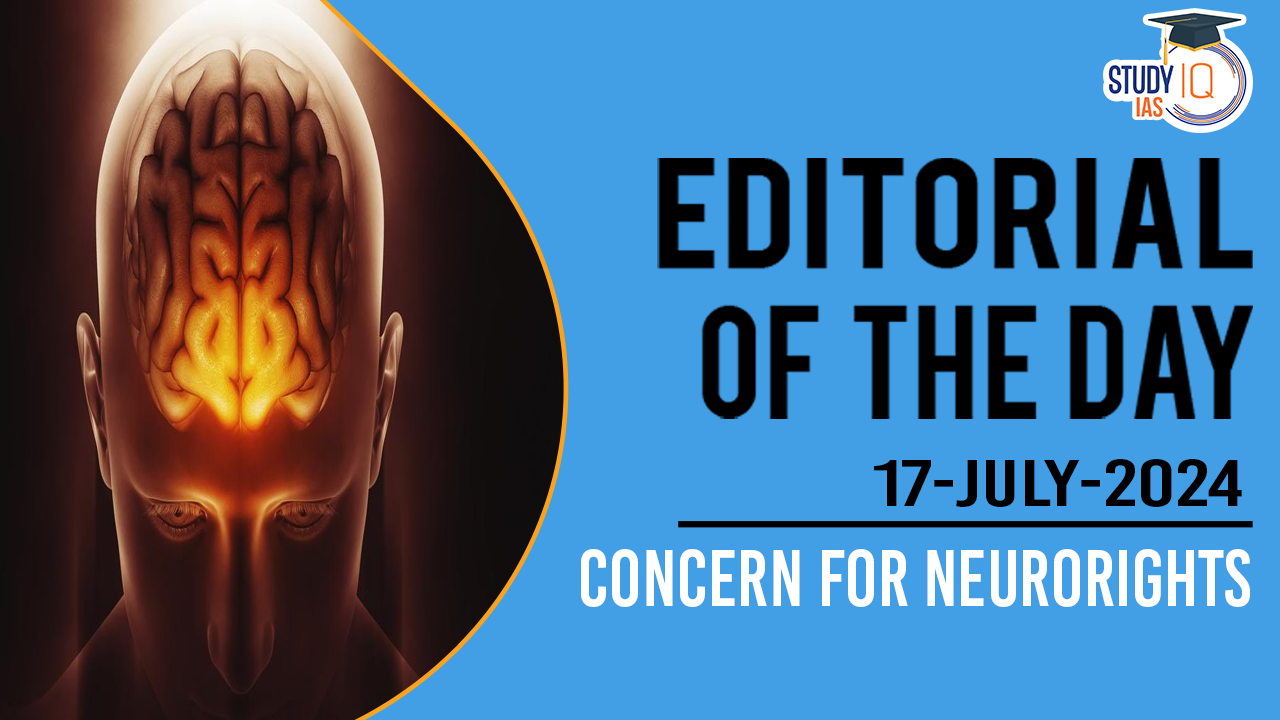Table of Contents
Context: The digitisation of neuro-data raises great opportunities as well as concerns.
What is Neurotechnologies?
- Neurotechnology encompasses all technologies developed to understand the brain, visualise its processes and even control, repair or improve its functions.
- Example: Electroencephalography (EEG), magnetic resonance imaging (MRI) scans, etc.
- Applications:
- Development of drugs to treat depression.
- Mental Health Treatment.
- Hearing Recovery (cochlear implants).
- Cognitive Function Assistance.
- Brain-Computer Interfaces (Example: Neuralink)
- Physiological and Emotional Monitoring.
| Key Terms |
|
Opportunities
- Neurodata from smartwatches, apps, and ‘embeddables’ can be transmitted to healthcare providers and private companies for enhanced health monitoring and personalised suggestions.
- Digitised health data is also valuable for advertising and marketing, particularly in neuromarketing.
- Improved diagnostics and treatments for neurological disorders.
- Potential to improve memory, decision-making, and other cognitive functions.
Risks Associated With Neurodata
- Surveillance and Privacy: The potential for invasive surveillance by employers, healthcare providers, and governments, which could lead to control over individuals’ behaviours and thoughts.
- Commercial Exploitation: The use of neuro-data in neuromarketing and other commercial applications can manipulate consumer behaviour, raising ethical concerns about consent and manipulation.
- Ethical Dilemmas: Neuro-enhancements and cognitive alterations pose ethical questions about equity, consent, and the natural limits of human capabilities.
- Regulatory Challenges: Existing legal frameworks may not adequately address the unique aspects of neuro-data and technologies, leading to gaps in protection and governance.
- Unintended Consequences: Rapid technological advances could lead to unforeseen health impacts or behavioural changes.
- Disparities: The accessibility and regulation of neuro-technologies can exacerbate socio-economic disparities between different regions and socio-economic groups.
Recent Steps and Ethical Frameworks
- S. Presidential Commission on Bioethics (2015): Published ‘Gray Matters’, focusing on ethical issues like cognitive enhancement and consent in neuroscience.
- OECD Recommendations (2019): Proposed principles to ensure the ethical use of neurotechnologies, emphasising the safeguarding of personal brain data and monitoring potential misuse.
- UNESCO’s Initiative (2022): Discussed the ethical challenges posed by neurotechnologies, especially around mental privacy and identity, leading to the development of a global framework on neurotechnology ethics.
- UNESCO has formed an expert group to create the first global ethical framework for neurotechnology, set for adoption by the end of 2025. Although it may not lead to a binding treaty, this framework is expected to significantly influence government policies and guidelines worldwide.
- Legal Developments:
- Chile (2021): Amended its constitution to protect neurorights.
- S. States (2024): Colorado passed a law to protect neurological privacy.
Way Forward
- Global Ethical Standards: Develop and adopt international frameworks that respect neurorights and provide guidelines for ethical neurotechnology use.
- Public Awareness and Education: Enhance understanding of neurotechnologies and their ethical, legal, and social implications among the public and policymakers.
- Research Governance: Implement robust governance structures that require neurotechnological research to proactively address ethical concerns.
- Legal Protections: Strengthen legal frameworks to protect individuals from potential abuses of neurotechnology.
- Interdisciplinary Collaboration: Encourage collaboration among neuroscientists, ethicists, legal experts, and policymakers.


 BharatSHRI Initiative: Digital Repositor...
BharatSHRI Initiative: Digital Repositor...
 IT Rules Amendment, 2026: Regulation of ...
IT Rules Amendment, 2026: Regulation of ...
 Tarique Rahman: From Exile to Prime Mini...
Tarique Rahman: From Exile to Prime Mini...




















